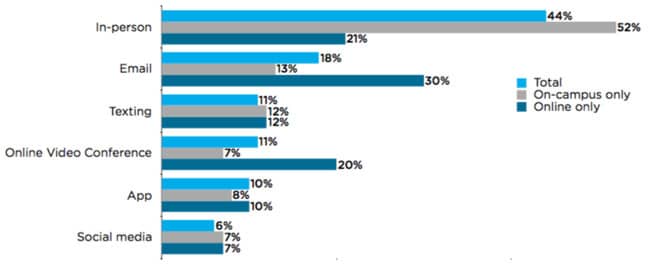Adapting student advising to boost retention and degree completion
A new survey has found that one in four undergraduate students enrolled at US colleges believe that it will be difficult for them to graduate, with anxiety and time management concerns cited as the biggest barriers. Nearly a third (30%) of Gen Z respondents cited study skills as one of the biggest obstacles to degree completion, whereas only 22% of Millennial students reported this as their top challenge. In a similar variation, 35% of Millennials said that being “overwhelmed by responsibilities” (e.g., balancing study and work, managing finances, academic planning, finding support) was one of their biggest barriers to degree completion. Meanwhile, only a quarter of Gen Z students said that managing such diverse responsibilities was their main challenge. Moreover, despite three-quarters of respondents saying that their academic advisor is the most important resource for helping them to make college decisions, less than half (48%) had met with their advisor over the past month and 24% hadn’t had a meeting for six months or longer. The survey was conducted with over 1,500 undergraduate students by Civitas Learning in collaboration with The Center for Generational Kinetics. The newly released study report is the first in a series of findings to be published from the survey.
Academic advising needs to evolve
The vast majority of students responding to the survey ranked an academic advisor as more important than other staff, family, or friends to help them make decisions, and fully 70% said that “about once a month” would be the ideal frequency for meetings. Yet as mentioned above, less than half were consulting with advisors that often. The survey asked students for their wishlist for a “more meaningful relationship” with their advisor – which might make them more likely to consult the advisor more often – and the top-ranked wishes were for:
- Advisors to be more knowledgeable about the college, professors and culture (30%)
- Advisors to know the students’ current situation better (30%)
- Advisors to proactively reach out the them (27%)
- Advisors to be more available to meet (27%)
Related to the last item, close to one in five students said that when they had an urgent issue, it was difficult or very difficult to meet with an advisor.
The survey findings also suggest that making a wider range of modes of advising available would increase the extent to which students could find help for their challenges. While 44% said that one-on-one personal meeting with an advisor would be their preference, significant proportions also said that emailing their advisor when they needed advice would be helpful (18%), and 11% said the same of being able to text their advisor or being able to have a one-on-one video conference.

















